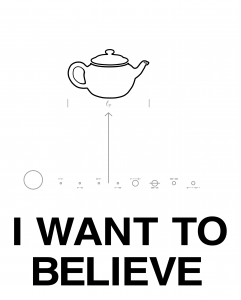If I were to suggest that between the Earth and Mars there is a china teapot revolving about the sun in an elliptical orbit, nobody would be able to disprove my assertion provided I were careful to add that the teapot is too small to be revealed even by our most powerful telescopes. But if I were to go on to say that, since my assertion cannot be disproved, it is intolerable presumption on the part of human reason to doubt it, I should rightly be thought to be talking nonsense. If, however, the existence of such a teapot were affirmed in ancient books, taught as the sacred truth every Sunday, and instilled into the minds of children at school, hesitation to believe in its existence would become a mark of eccentricity and entitle the doubter to the attentions of the psychiatrist in an enlightened age or of the Inquisitor in an earlier time.
Bertrand Russel, “Is There a God?” (commissioned but never published) in Illustrated Magazine, 1952
Si je suggérais qu’entre la Terre et Mars il se trouve une théière en porcelaine tournant autour du soleil sur une orbite elliptique, personne ne pourrait réfuter mon affirmation à condition que je prenne soin d’ajouter que la théière est trop petite pour être révélée même par nos télescopes les plus puissants. Mais si je devais poursuivre en disant que, puisque mon affirmation ne peut être réfutée, il est intolérable que la raison humaine en doute, on devrait à juste titre penser que je dis n’importe quoi. Mais si l’existence d’une telle théière était affirmée dans les livres anciens, enseignée comme la vérité sacrée chaque dimanche et inculquée aux enfants à l’école, l’hésitation à croire en son existence deviendrait une marque d’excentricité et donnerait au douteux le droit aux attentions du psychiatre à une époque éclairée ou de l’inquisiteur à une époque antérieure.
Bertrand Russel, “Is There a God?” (commissioned but never published) in Illustrated Magazine, 1952
Bertrand Russel, “Is There a God?” (commissioned but never published) in Illustrated Magazine, 1952
